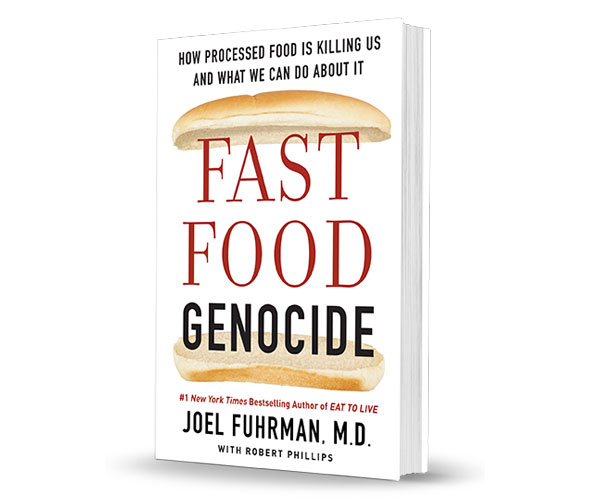by Christian Boyles
Fast Food Genocide: How Processed Food is Killing Us and What We Can Do About it
TX357 .F84 2017
About the book
Fast food is far more than just the burgers, fries, and burritos served at chain restaurants; it is also the toxic, human-engineered products found in every grocery store across America. These include: cold breakfast cereals; commercial and preserved (deli) meats and cheeses; sandwich breads and buns; chips, pretzels, and crackers; fried foods; energy bars; and soft drinks. Fast foods have become the primary source of calories in the United States and consequently the most far-reaching and destructive influence on our population. The indisputable truth is that our highly processed diet is the source of a national health crisis that is exploding into a genocide with unseen tragic implications.
Heart attacks, strokes, cancer, obesity, ADHD, autism, allergies, and autoimmune diseases all have the same root cause – our addiction to toxic ingredients. New York Times bestselling author, board-certified physician, nutritional researcher, and leading voice in the health field Joel Fuhrman, M.D., explains why the problem of poor nutrition is deeper, more serious, and more pervasive than anyone imagined.
Fast Food Genocide draws on twenty-five years of clinical experience and research to confront our fundamental beliefs about the impact of what we eat. This book identifies issues at the heart of our country’s most urgent problems. Fast food kills, but it also perpetuates bigotry and derails the American dream of equal opportunity and happiness for all. It leaves behind a wake of destruction creating millions of medically dependent and sickly people burdened with poor-quality lives.
The solution hiding in plain sight — a nutrient dense healthful diet — can save lives and enable humans to reach their intellectual potential and achieve successful and fulfilling lives. Dr. Fuhrman offers a life-changing, scientifically sound approach that can alter American history and perhaps save your life in the process.
Meat Makes People Powerful: a Global History of the Modern Era | TX371 .W37 2018
From large-scale cattle farming to water pollution, meat— more than any other food—has had an enormous impact on our environment. Historically, Americans have been among the most avid meat-eaters in the world, but long before that meat was not even considered a key ingredient in most civilizations’ diets. Labor historian Wilson Warren, who has studied the meat industry for more than a decade, provides this global history of meat to help us understand how it entered the daily diet, and at what costs and benefits to society. Spanning from the nineteenth century to current and future trends, Warren walks us through the economic theory of food, the discovery of protein, the Japanese eugenics debate around meat, and the environmental impact of livestock, among other topics. Through his comprehensive, multifaceted research, he provides readers with the political, economic, social, and cultural factors behind meat consumption over the last two centuries. With a special focus on East Asia, Meat Makes People Powerful reveals how national governments regulated and oversaw meat production, helping transform virtually vegetarian cultures into major meat consumers at record speed.
As more and more Americans pay attention to the sources of the meat they consume, Warren’s compelling study will help them not only better understand the industry, but also make more informed personal choices. Providing an international perspective that will appeal to scholars and nutritionists alike, this timely examination will forever change the way you see the food on your plate.
Foods That Changed History: How Foods Shaped Civilization from the Ancient World to the Present | TX349 .C86 2015
Written with the needs of students in mind, Foods That Changed History: How Foods Shaped Civilization from the Ancient World to the Present presents nearly 100 entries on foods that have shaped history—fascinating topics that are rarely addressed in detail in traditional history texts. In learning about foods and their importance, readers will gain valuable insight into other areas such as religious movements, literature, economics, technology, and the human condition itself.
Readers will learn how the potato, for example, changed lives in drastic ways in northern Europe, particularly Ireland; and how the potato famine led to the foundation of the science of plant pathology, which now affects how scientists and governments consider the dangers of genetic uniformity. The entries document how the consumption of tea and spices fostered global exploration, and how citrus fruits led to the prevention of scurvy. This book helps students acquire fundamental information about the role of foods in shaping world history, and it promotes critical thinking about that topic.
Fed Up (DVD) | HD9005 .F385 2014
Narrated by Katie Couric, Fed Up blows the lid off everything we thought we knew about food and exercise, revealing a 30-year campaign by the food industry aided by the U.S. government to mislead and confuse the American public. Exposing the hidden truths contributing to one of the largest health epidemics in history, the film follows a group of families battling to lead healthier lives and reveals why the conventional wisdom of exercise and eat right is not ringing true for millions of people struggling with diabetes, childhood obesity and other serious conditions. Including captivating interviews with the country’s leading experts, this vital information could change the way we eat forever.

